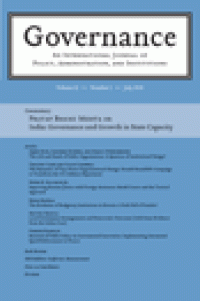
Journal Articles
Policymaking in Multiparty Presidential Regimes: A Comparison between Brazil and Ecuador
This paper explores why two countries with similar electoral, partisan, and presidential institutions, have produced significantly different policy outcomes in Latin America. Brazil and Ecuador are conventionally known as having highly fragmented party systems, where legislators have great incentives to cultivate a personal vote. Presidents are perceived to be strong and to make large use of government resources in order to advance their agenda. Yet, policies in Brazil are more likely to respond to shocks and to be more stable over time than policies in Ecuador, where policies remain vulnerable to political changes and realignments. We argue that this variation is explained by the different nature of political coalitions formed in each country. We identify three factors that increase the executive's ability to craft governing coalitions in congress: the availability of valuable coalition currencies, the influence of long-term political horizons, and the extent to which political transactions are credibly and effectively enforced.
Availability
No copy data
Detail Information
- Series Title
-
Governance
- Call Number
-
-
- Publisher
- Hoboken, United States : Wiley-Blackwell., 2010
- Collation
-
-
- Language
-
English
- ISBN/ISSN
-
09521895
- Classification
-
-
- Content Type
-
-
- Media Type
-
-
- Carrier Type
-
-
- Edition
-
Volume 23, Issue 4, pages 641–666, October 2010
- Subject(s)
- Specific Detail Info
-
-
- Statement of Responsibility
-
-
Other version/related
No other version available
File Attachment
Comments
You must be logged in to post a comment
 Computer Science, Information & General Works
Computer Science, Information & General Works  Philosophy & Psychology
Philosophy & Psychology  Religion
Religion  Social Sciences
Social Sciences  Language
Language  Pure Science
Pure Science  Applied Sciences
Applied Sciences  Art & Recreation
Art & Recreation  Literature
Literature  History & Geography
History & Geography